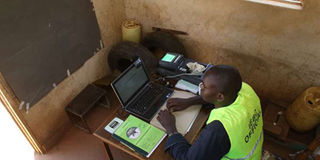Population registration system can be used to rope in voters

Independent Electoral and Boundaries Commission clerk waits for people to register as voters at Nyahururu matatu stage in Nyeri town on February 17, 2016. PHOTO | JOSEPH KANYI | NATION MEDIA GROUP
What you need to know:
- A key objective of the system is to facilitate efficient coordination and linkage of registration agencies.
- Our policy makers have not yet considered the Independent Electoral and Boundaries Commission as one of those registration agencies.
- Kenyans are still grappling with voter registration, including issues of multiple registration and reports of dead people voting.
- The government has many agencies that carry out registration of citizens at different points.
In March, 2015, the Integrated Population Registration System was launched to increase efficiency and effectiveness in public service by improving population registration.
The system established the National Population Register that contains the personal information of all Kenyans and foreigners.
A key objective of the system, which is under the Ministry of Interior and Coordination of National Government, is to facilitate efficient coordination and linkage of registration agencies.
Sadly, our policy makers have not yet considered the Independent Electoral and Boundaries Commission as one of those registration agencies.
Instead, Kenyans are still grappling with voter registration, including issues of multiple registration and reports of dead people voting.
The electoral commission carries out occasional mass voter registration as an independent agency and does not use data from any other government agency.
While this is a good thing, it also limits the number of voters that the commission can rope in.
BENEFITS OF E-GOVERNMENT
The government has many agencies that carry out registration of citizens at different points.
It follows that these agencies should complement one another to buttress registration records and accuracy.
All government agencies, including the electoral commission should integrate and collate their records with the National Population Register because it contains the most accurate data on registration of people in Kenya.
We have seen the benefits of e-government in critical services especially in payment for government services and the lauded Huduma Centres that have transformed service to citizens.
Replacing a lost national identity card now takes days instead of months.
The joint select committee on election reforms observed that 9.2 million eligible Kenyans have yet to be registered as voters even as the electoral commission concluded its latest mass voter registration in March.
Note that these 9.2 million Kenyans have national identity cards but for some reason, did not register as voters.
If Kenyans were serious about every eligible person’s right to vote, all of these 9.2 million voters would have automatically been enlisted as voters.
The population registration system was created to improve the accuracy and reliability of Kenya’s registration capacity in the relevant agencies.
Colossal benefits would accrue were Parliament to legislate to allow the electoral commission to use the population registration system.
Most importantly, everyone above 18 years would automatically be registered to vote and this would eliminate the disenfranchisement of Kenyans who have IDs but cannot vote because they live in places far from the voter registration stations.
Kenyans would be issued with multi-purpose IDs that can be used to perform various activities.
This would also help the government to eliminate bureaucracy and costs that come with processing and producing additional documents such as IDs, driving licences, and social security cards.
UNNECESSARY COSTS
One of the reasons for the increase in the electoral commission budget from Sh24 billion in 2013 to Sh44 billion in 2017 was to register an additional eight million voters.
If the electoral commission was allowed to use the population registration system, it would save money and precious time, leaving it free to ensure free and fair elections.
However, such an integration and collation of people’s records under the National Population Register would have implications on the privacy of personal data and the possibility of manipulation of the system.
There would have to be a good data protection law to ensure that the minimum extractions that a particular registration agency can make are stipulated.
Additionally, control and verification processes would have to be regularly engaged to ensure the integrity of the register.
Political parties should be able to interrogate all components relevant to counties, constituencies, and wards.
If this were done, the electoral commission would only have to maintain a voter register that contains information on the number of voters in the various electoral units, including data on the lawful transfer of voting jurisdictions.
As we approach the next elections, Kenyans need to reflect on the heavy price of botched elections.
Policy makers should as much as possible adopt practical solutions to our electoral challenges.
Mr Kiprono is an advocate of the High Court of Kenya and a senior programmes officer at Article 19 - Eastern Africa.





